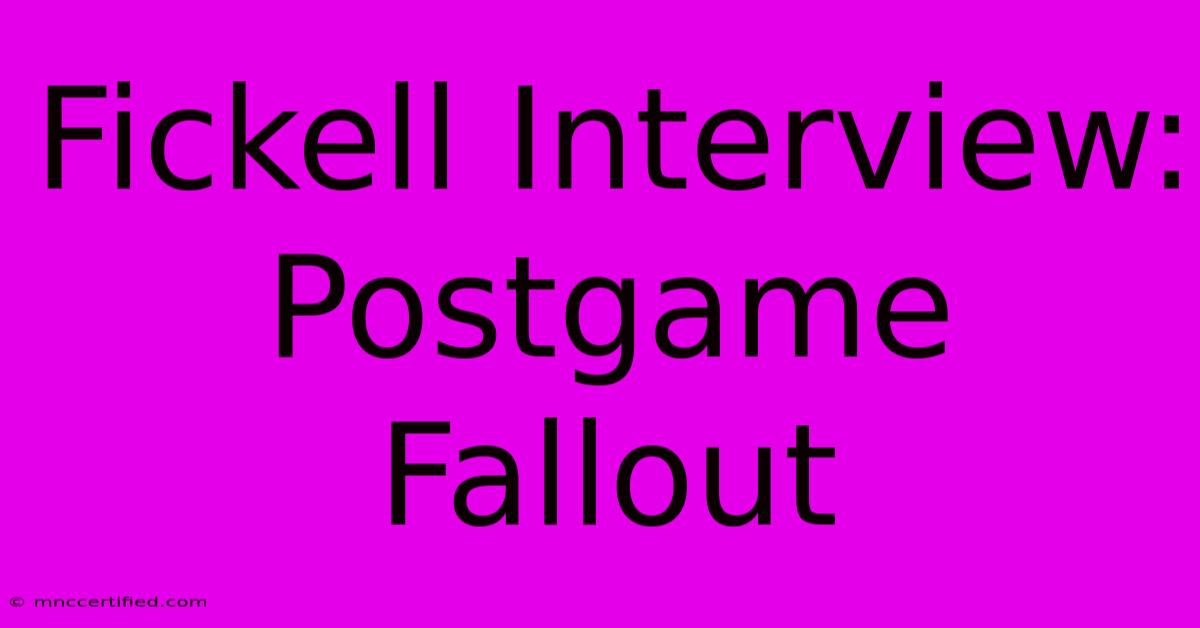Fickell Interview: Postgame Fallout

Table of Contents
Fickell Interview: Postgame Fallout – Analyzing the Coach's Reactions
The postgame interview. A crucible of emotions, where the highs of victory and the lows of defeat are laid bare for all to see. For coaches, it's a delicate dance between accountability, optimism, and strategic communication. This article dives deep into the postgame interview fallout, analyzing common themes, strategic messaging, and the impact these interviews have on public perception and team morale. We'll explore how coaches navigate the pressure cooker environment of a postgame press conference, focusing on the recent example of Coach Fickell's interviews.
Deconstructing the Fickell Postgame Interviews: A Case Study
Coach Fickell's postgame interviews often provide a fascinating insight into his coaching philosophy and team dynamics. Whether celebrating a hard-fought win or dissecting a disappointing loss, his responses often reveal key elements:
The Importance of Accountability:
Keyword: Accountability, responsibility, ownership, leadership
Fickell consistently demonstrates a strong sense of accountability. He doesn't shy away from responsibility, whether praising individual players for exceptional performances or acknowledging team shortcomings. This forthrightness fosters trust with fans and players alike. His ability to take ownership, even in defeat, projects leadership and prevents finger-pointing. This is crucial for maintaining team cohesion and building a strong team culture.
Strategic Messaging and Spin:
Keyword: Communication, messaging, public relations, media strategy
While honesty is paramount, Fickell's interviews also demonstrate a keen understanding of strategic messaging. He carefully chooses his words to manage public perception and maintain team morale. After a loss, he might highlight areas of improvement without dwelling on negatives. Following a win, he balances celebration with a focus on future challenges, preventing complacency. This measured approach is a hallmark of effective coaching and public relations.
Emotional Intelligence:
Keyword: Emotional intelligence, empathy, composure, leadership
One striking aspect of Fickell's interviews is his display of emotional intelligence. He maintains composure even under pressure, demonstrating empathy towards players and respect for opponents. This balanced approach builds a positive image, projecting strength and integrity. His ability to manage his own emotions effectively helps to create a calm and focused atmosphere, both for the team and the public.
The Impact of Postgame Interviews: Beyond the Press Conference
The impact of a coach's postgame interviews extends far beyond the immediate press conference. These interviews influence:
- Fan Perception and Support: Honest and accountable responses build trust and loyalty among fans.
- Recruiting: Positive media portrayals can attract top talent.
- Team Morale: A coach's response can significantly impact the players' emotional state after a win or loss.
- Media Relations: Building a positive relationship with the media is crucial for a coach's overall success.
Analyzing the Fallout: Long-Term Implications
The "fallout" from a postgame interview can be far-reaching. A poorly handled interview can lead to negative headlines, impacting team morale and recruiting efforts. Conversely, a well-executed interview can enhance the coach's reputation and solidify public support. Analyzing the long-term implications of these interviews requires careful consideration of their impact on all aspects of the program.
Conclusion: Mastering the Postgame Press Conference
The postgame interview is a critical element of a coach's role. The ability to navigate the emotional complexities of victory and defeat while effectively managing public perception is essential for success. By examining examples like Coach Fickell's interviews, we can gain valuable insights into the strategic communication and emotional intelligence required to master this challenging aspect of coaching. This careful approach ensures positive long-term impacts on the team, the fans, and the overall program.

Thank you for visiting our website wich cover about Fickell Interview: Postgame Fallout. We hope the information provided has been useful to you. Feel free to contact us if you have any questions or need further assistance. See you next time and dont miss to bookmark.
Featured Posts
-
Fickell Interview Postgame Fallout
Nov 30, 2024
-
Best Sephora Black Friday 2024 Deals
Nov 30, 2024
-
College Football 3 Playoff Deciders
Nov 30, 2024
-
Tracking Ps 5 Black Friday Deals
Nov 30, 2024
-
Sheffield Utd Vs Sunderland Afc Preview
Nov 30, 2024